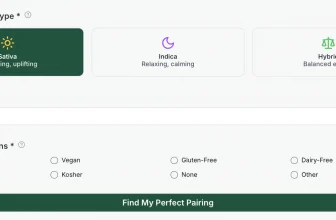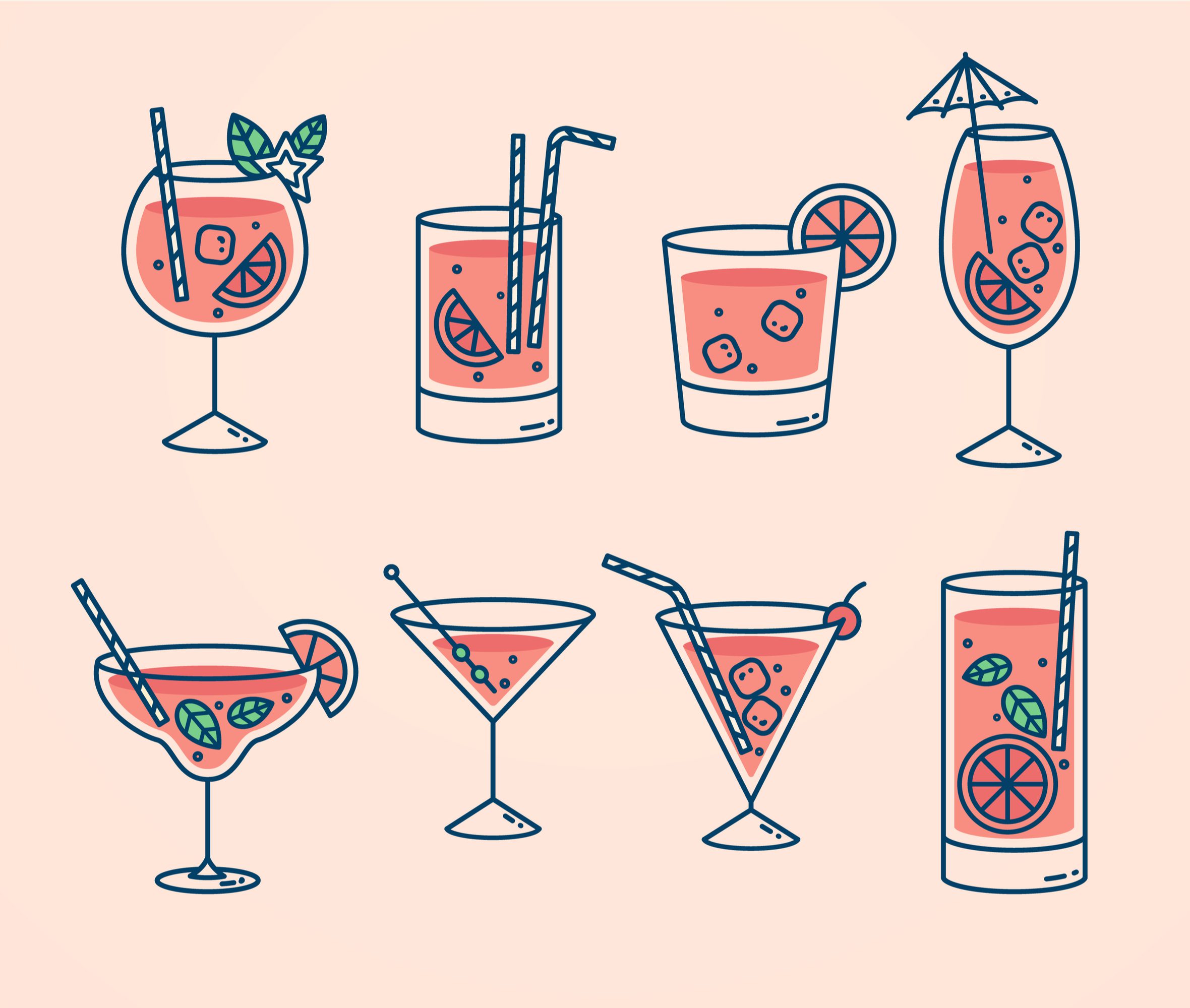
There’s nothing quite like throwing back a lovely cocktail to unwind and enjoy — and that means having the right cocktail glasses. Folks enjoy their adult beverages in a variety of ways. Some prefer sipping on straight spirits, savoring the purity of a finely distilled product. Others might love a simple mix of two ingredients like a classic Rum and Coke.
Why Care About Cocktail Glasses?
Maybe you want to go a little fancy to liven things up? Trust us — there are hundreds of different ways to enjoy your coveted cocktails. But the real alcohol aficionados know the simple truth about how a truly perfect drink starts: by holding the cocktail glass in your hand that your drink demands.
Cocktail glasses come in many shapes and sizes. It may all seem random, but the truth is that there is a method to their madness. Look around any properly stocked bar, and you will see the patrons sipping their elixirs from specific receptacles, each designed to enhance the drinker’s experience.
You can end up going down a real rabbit hole when it comes to cocktail glasses. Variants upon variants will pop up not only depending upon what’s being poured into the glass but also for specific regions and special events. But there are some basics that everybody should know. Here’s a quick look at the most prominent types of cocktail glasses and why they matter:
1. The ‘Bottoms Up’ Glass
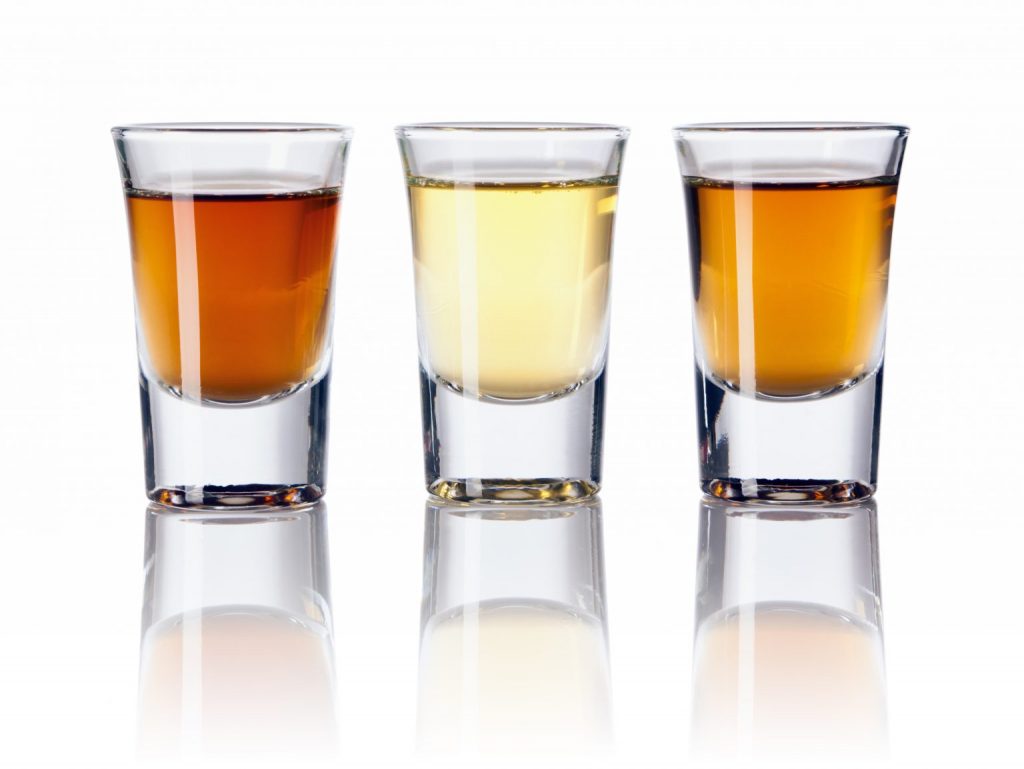
Starting at the short end of the cocktail glasses spectrum, we begin with the smaller entries. First, consider the humble shot glass. An American invention from the 17th century, the design of a small glass with a single measure of spirits was originally meant for “whiskey tasting.” Over time, traditions emerged that made it perfect for making celebratory toasts and hastening the inebriation process!
Meant to be swallowed quickly, the shot glass also has a practical use as a measurement. Although there is no standard, they typically come in 1-1.5-ounce sizes (or 50-100 milliliters in metric countries) and are often cited in cocktail recipes for liquor proportions. There are no ground rules for choosing shot glasses — they’re meant to be fun. Pick out whatever design makes you laugh or inspires you to shoot one down.
2. The ‘On the Down Low’ Cocktail Glass
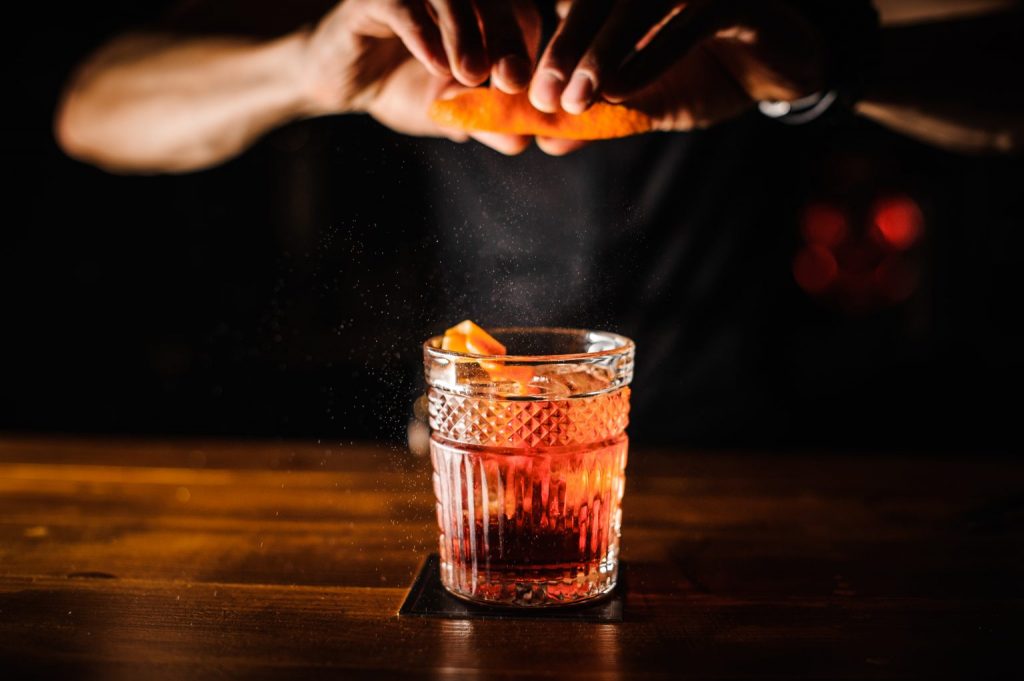
Sprouting up from the shot glass category is the classic “rocks” glasses, a type of short tumbler. These are seminal cocktail glasses meant for either slowly enjoying straight spirits like bourbon or tequila or serving up complex cocktails. They come by many names, including Old Fashioned glasses (named after one of the earliest drinks they were meant for) and lowball glasses.
A quintessentially English creation from the 18th century, they are perfect for sipping liquor neat or on the rocks, their wide mouths meant to allow the imbiber to take in the aromatics. But they are also where you will find your favorite Mojito or Whiskey Sour. By far, these are the most common cocktail glasses you’ll see at the bar. When picking your own, be sure to find one with a sturdy bottom so you can confidently muddle herbs, mint, or fruit right in the glass.
3. “Going on High” Glass
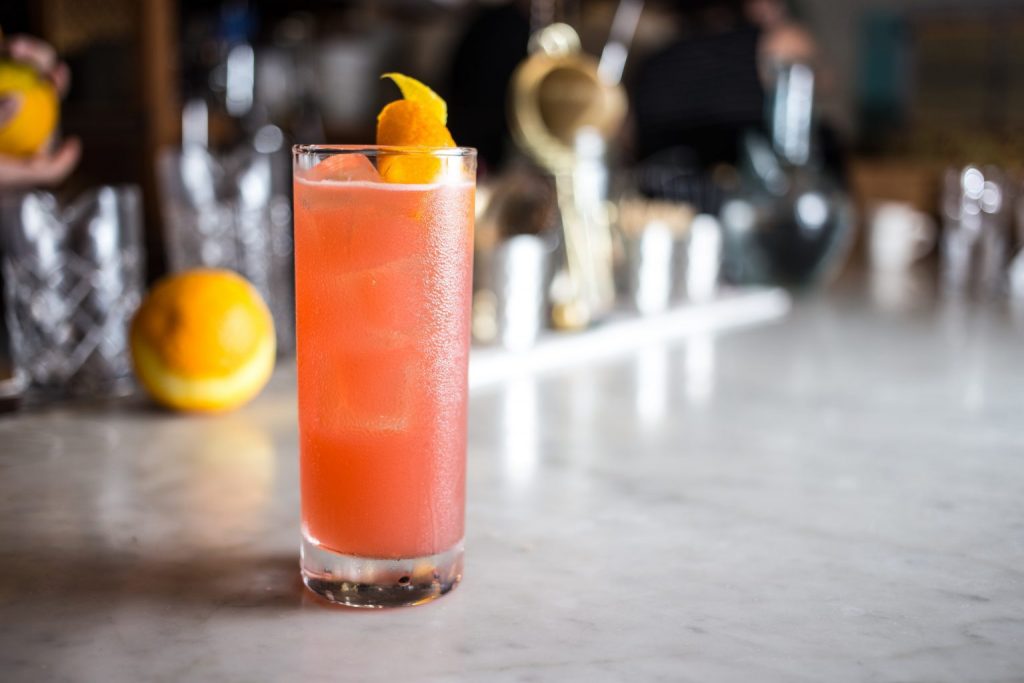
The second most common cocktail glasses you’ll see in your favorite watering hole will likely be the venerable highball glass. Almost certainly an invention of late 19th-century America, these are the go-to cocktail glasses for two-ingredient drinks such as the Gin Rickey or the Greyhound. Highball glasses typically range from about eight ounces to 12 ounces. When choosing your own, getting a hearty, thick glass is preferable as it helps retain the cold of the ice cubes better and allows for a good hard grip.
The Collins glass is a close sibling to the highball glass. Just a little bit taller and thinner than the classic highball glass, this is a cocktail glass meant to add a little punch to the drink. Thanks to their being an inch or two taller than the highball, Collins glasses can accommodate more ice and more alcohol; think of it as a perfect way to turn your Jack and Coke into a “double.” The mouth tends to be smaller on these, and the glass itself narrower. A good way to think of it is as leaner and meaner than the highball!
4. The “Shaken or Stirred” Martini Glass
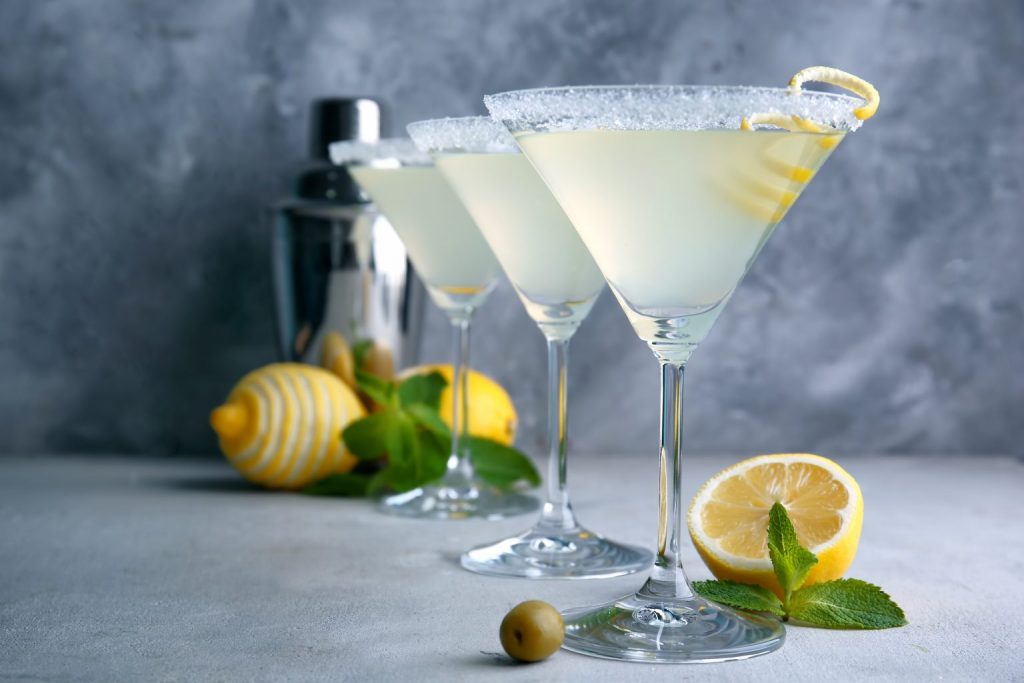
And now we must make our way to one of the most fabled drinks of them all — the Martini. This legendary cocktail is the gold standard of chilled drinks and can only be properly served in the correct cocktail glass. The Martini glass made its official debut in the 1925 Paris Exhibition. It was a modernist play on the traditional Champagne coupe: thin stem, separate from a wide canonical rounded mouth, held up with a sturdy circular base. Since ice is not meant to be in the glass, the drinker holds it by the stem, keeping the body heat from warming up the beverage.
Designed for the enjoyment of Champagne, it quickly became the go-to cocktail glass for Martini recipes such as the Cosmopolitan. Chilling the drink in a shaker then straining the ice as it is poured means a shorter period for it to stay cool, hence the buffering stem to hold the drink by. Delicate and classy, these cocktail glasses are a must for anybody wishing to kick their mixology skills up a notch past basic highball and rocks recipes.
5. Wine Glasses
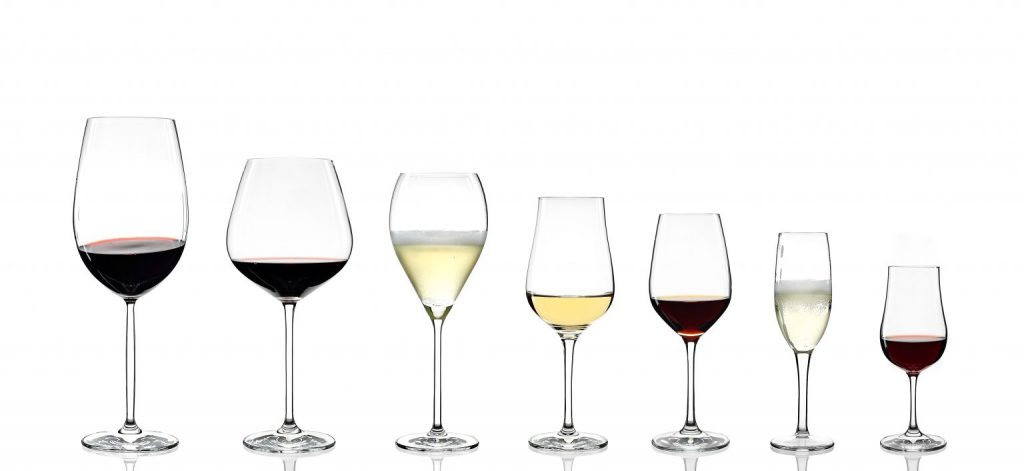
If you really want to be a “glass act” about what type of alcohol you pour into what kind of receptacle, there can be no more elegant selection to clink against than the storied wine glass. Having a proper set of wine glasses in your cupboard is absolutely essential if you’re going to properly entertain those with a taste for the grape. Using the right kind of wine glass for the right type of wine will actually make it taste better, not to mention improve how it affects the nose.
Let’s start with the classic. Back in the 1400s, Italian glass blowers first created what we consider the modern wine glass: the big circular bowl, the thin stem, and the broad base. And it was made for red wine. The balloon-like top is meant to increase the surface area of the wine to expose it more widely to the air. This maximizes the opportunity for the vino to make contact with oxygen. Even all those centuries ago, folks knew that briefly interacting wine with oxygen mellowed out the tannins and blended the complex flavors.
As for white wine glasses, the strategy is a little different. These start out more U-shaped, sort of like a tulip, and hold less volume than the red wine glasses. So why is that?
Consider the different ways we enjoy white wines. For one thing, they’re served cold, not room temperature. This shape helps retain the temperature, keeping it from warming up too soon. Then there’s the fact that white wines are, by nature, more aromatic than their red cousins. A narrower rim concentrates those aromas and allows the drinker to enjoy it on the nose more. Keep in mind, all of this also works well for rosé, so you can serve those up to your oenophile pals as well!
6. Chill Chalices and Final Cocktail Glass Choices
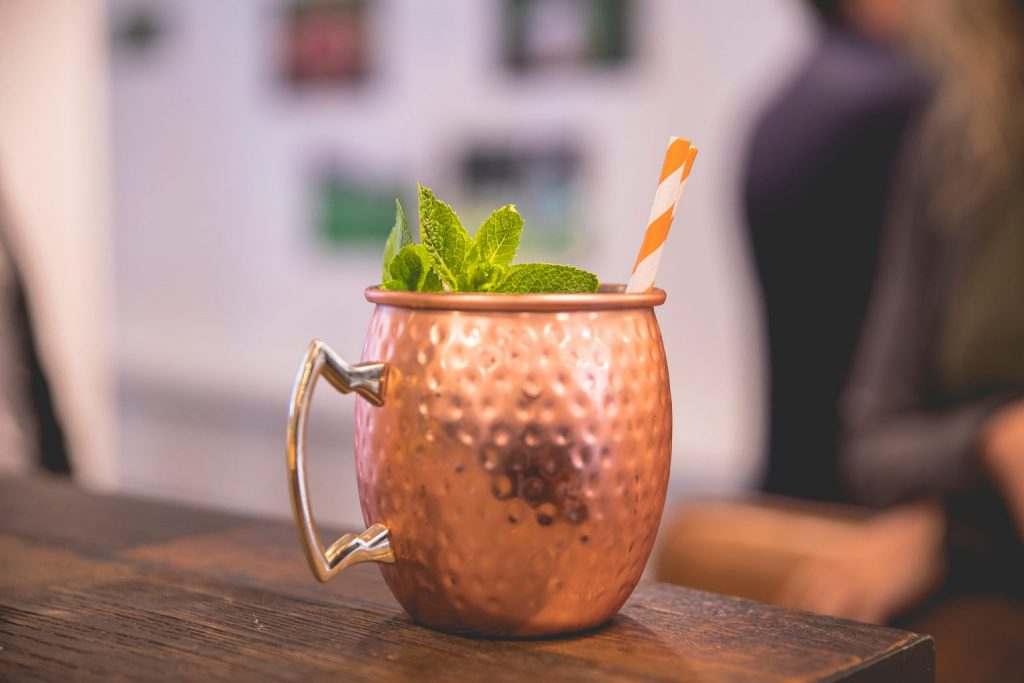
As stated at the start, you really can go down a rabbit hole when it comes to cocktail glasses. There is an enormous number of specialized varieties that you could fill your cupboards with. Tiki glasses can be a fun alternative to highball glasses for serving Mai Tais in a festive atmosphere. Copper mugs are a favorite for presenting a Moscow Mule.
And then, of course, there is the funky Margarita glass with its hat-like rim at the ready to receive a good heaping of coarse salt. Wine glasses, brandy snifters, Irish Coffee mugs — the list goes on and on.
In Summary
Unless you’ve got some serious bar space in your home, you can get away with adding just three basic types of cocktail glasses to your cupboards: rocks glasses, highball glasses, and Martini glasses. Almost every type of drink can be properly imbibed from that trio, even untraditional choices like beer in highball glasses, wine in Martini glasses, or Cognac in lowball glasses.
When buying your cocktail glasses, be sure the lowballs are strong and bottom heavy. Highball glasses should be ample and wide for the mouth. And Martini glasses should have a sturdy base with a stem perfect for three-finger grabbing. Set up your home bar with these basics, and you’ll be ready to serve up the good stuff to your peeps!



